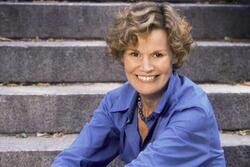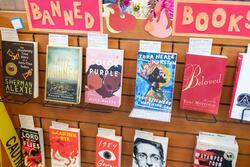Opposing Book Bans with Judy Blume
I grew up with no rules regarding what I could read, so naturally I devoured every book I could get my hands on. During the day, I read Wendy Mass, J.K. Rowling, and Madeleine L’Engle. At night, it was time for Louise Fitzhugh, the Grimm brothers, and Norton Juster. I’d go to the library with my parents and come back home with precariously stacked, wobbly towers of books that were much too heavy for me to carry. I constantly searched for my next favorite book, and my family encouraged it as long as I didn’t let any become overdue.
Reading by choice throughout my childhood helped shape much of my identity and develop my values. In particular, literature deepened my pride for my own femininity. I can clearly remember the first time I read a book about a girl getting her period, the first time I picked up the American Girl body book, and the first time I scoured Urban Dictionary with my best friend behind my couch in elementary school in order to find the least vulgar word. (Spoiler alert: there are no innocent words on Urban Dictionary.) In vastly different ways, everything I read shaped my ideas about women- her body, systems, and societal expectations.
Are You There God? It’s Me, Margaret (AYTGIMM) by Judy Blume has a special place in my heart for its relatability and sweet stories about girlhood based on Blume’s own middle school experiences. Margaret is a middle schooler who has just moved to New Jersey and struggles to feel as caught up as her peers are on puberty and religious affiliation. She talks to God casually, asking for seemingly simple favors like getting her period. With her new group of friends from school, she joins pacts to buy bras, tell each other about boys, and pray together that they will begin menstruation soon. They perform strict rituals, shouting, “We must- we must- we must increase our bust!” in order to grow their boobs.
Margaret’s friends may sound silly, but they are also quite realistic, even though this novel was written in the 70s. My middle school friend group went through parallel experiences: making promises to tell each other about our periods, writing lists of what a perfect boyfriend would be like, and being simultaneously horrified and entranced by the promise of bra shopping. The deep learning that middle school girls undertake together as they go through adolescent change is perfectly represented in this book.
This is why it breaks my heart that anyone would try to ban such a timeless and pertinent story. The move to ban books in American schools tends to target novels that include characters in minority groups or that tackle themes of race, LGBTQ+ identity, and sexuality. A report from PEN America found that there are currently 1,586 book bans or restrictions in the United States, mainly the grounds of obscenity. Judy Blume has been censored since the beginning of her publishing career, with AYTGIMM, her second novel, specifically challenged because of its honest writing about menstruation, puberty, and teen sexuality. She never aimed to be controversial, though. “I just wanted to be real. I wanted to be honest,” she said in an interview with CBC. And it is honest: when I read AYTGIMM back now, I am reminded of much of how it feels to be growing into my womanhood. However, the moments that define womanhood are different for everyone, making it even more important that kids have multiple stories that they feel represented by and can learn from.
Unfortunately, throughout history powerful people have banned (if not burned) books that they found to be provocative or lewd, often on the basis of religious offense. While it is absurd that anyone is facing censorship in the twenty-first century, especially for clearly fictional stories, Blume put the outrage simply. When she first faced censorship she said that she thought to herself, “This is America: we don’t ban books. But then we did.” Censorship is an obvious affront to the American value of the freedom of speech as well as being illogical. No matter how many books are banned, sex, masturbation, menstruation, and puberty are all subjects that almost all young women will learn about, and be affected by, eventually.
In my own life, the first time I read a novel with a girl that got her period in it, I confided in my best friend, worried that I would be caught off-guard with this new experience and would be woefully unprepared. Unfortunately, my friend shut me down and told me that talking about periods was not appropriate for (elementary) school. Without the confidence to talk to my parents about the book, nor the courage to continue asking my friends about it, being able to learn through stories like AYTGIMM on my own time allowed my questions to be answered.
Having the option to read Blume’s book about growing up as a girl did not necessarily change my view on womanhood, but it helped me feel more comfortable reaching out for help. Evidently, many young women have felt the same about Blume. In 1986, she created Letters to Judy, a compilation of letters from kids that felt they could not turn to their parents because they feared being judged, so they turned to Judy Blume novels instead. I’m disheartened and worried about the future of curious girls when I think about the banned book movement. By taking away these valuable books, younger girls will be more inclined to reach for more easily accessible yet more harmful information—social media, tabloids, and unrestricted internet searches. They will find questionable resources, just like I did on Urban Dictionary, but they will not have the personal stories to balance it out.
However, book banners are losing at their own game if they think they can stop girls from accessing media that will teach them about puberty, race, gender, and sex. Taking away a comforting story that offers reassurance about a girls’ preteen years is disappointing and ridiculous. In the words of Judy Blume, “censorship grows out of fear, and because fear is contagious, some parents are easily swayed. Book banning satisfies their need to feel in control of their children’s lives. This fear is often disguised as moral outrage.” Blume has shown for more than thirty years that she is not afraid to continue talking about societal taboos, and will stand up to the moral outrage directed at books. With inspiring figures like her paving the way for the rest of us to stand up for anti-censorship, there are several easy ways to get involved. Speaking out publicly and reporting book bans will make a difference in your community. Even simply reading banned books and talking to friends and family about censorship can help. Above all, it is best to not leave the curious kid with nobody to learn from.
This piece was written as part of JWA’s Rising Voices Fellowship.








Thank you for your story, Sonia. This is the right time for young women like YOU to be advocating for stories and information to help girls and women be the best they can be. Fear is the reason for book banning. The job is reduce fear with understanding. Know that I'm a fan of your Sarasota grandmother...and now of yours.